4. When did you first read “The Death of Superman”? What were your initial thoughts on the story itself, and has your view changed at all over the years?
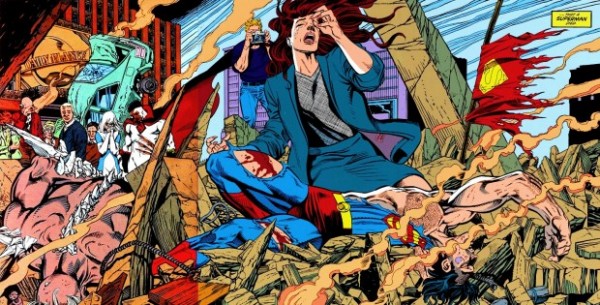
Greg: I read the story as it happened, from week to week. Granted, I didn’t get the full picture (thanks to the JLA issues) until I read the trade paperback collection a few months after the actual death issue, but I distinctly remember turning each page of that final issue with dread, terrified to see the final fate of my favorite hero at the time.
I’ll admit that Superman #75 is the first comic that ever made me cry. I remember balling my eyes out as I turned to the final, iconic splash page of Superman dead in Lois’ arms. Here was a character I loved so much sacrificing himself for a bunch of people who didn’t always appreciate what he did. I thought it was the best comic book I’d ever read.
Today, I can’t say that, but it’s still one of my favorites. I think it’s an amazing example of death done right in comics, with meaning and with passion. I count Death, Funeral for a Friend, and Reign of the Supermen as one giant epic, an amazing celebration of everything that’s great about Superman, and a fun look back at action-packed early ‘90s comics that still managed to strike an emotional chord.
Nick: Strangely enough, I only finally read the story this spring for the first time. What’s important to remember is that there have been a number of similar stories told in the years since, so the story felt a bit more generic and familiar to me than it probably did to readers who read it as it was released. Still, it’s a good, not a great, story. I’ve yet to read any of the Funeral for a Friend/Reign of the Supermen/Return of Superman stuff, though from how it’s been described to me, I think I’d probably enjoy that more than the actual death itself, much like I enjoyed Ultimate Fallout and the first few issues of Miles Morales’ Ultimate Spider-Man title more than I did Death of Spider-Man.
Todd: I read it each week as it came out, and I read the crossovers (Justice League) as well. I thought the story was fairly boring and straightforward compared to some of the more sophisticated things I was reading at the time (Hellblazer, Sandman, and even The Flash). Also, I just wasn’t a huge fan of Dan Jurgens’ scripting and artwork at the time, but I’ve grown to appreciate his clean storytelling over the years. The story itself has aged a bit poorly—there’s not very much “there” there.
Russell: I was 12 when I first read the complete Death of Superman. I borrowed the trade from a friend and I couldn’t put it down. I think I borrowed it from him a couple more times after that, too. It was a seriously exciting story with some great Dan Jurgens art work. He wasn’t the only artist on the story, but his art stood out to me more than any of the others. And Dan’s writing really hit home for me, too. His love of Superman really came through in the pages.
The story was a bit confusing for me since it referenced things I wasn’t previously aware of (Lex Luthor was “dead” but there was this guy claiming to be his son, who were these lizard people at the beginning of the story and what does it have to do with anything?) and some of the characters were unfamiliar to me at the time (Booster Gold, a Supergirl who wasn’t Supergirl?). But instead of turning me off to the story, those things made me curious to find out more. After it was over I felt like I had been on a real rollercoaster ride and wondered if any of the Superman books prior to this were as good. And even though it was kind of sad at the time, I was o.k. with Superman being dead since he was an “older” superhero and it was time for the new characters to have a chance to shine. I feel differently about this now, as I’ve become a much bigger Superman fan. He’s a timeless (and virtually ageless) character who should serve as an inspiration to other heroes and fans alike.
Tim: Well, I know I read the actual death issue the day it came out, again thanks to That Aunt. (Which I say with genuine affection. She didn’t camp out overnight in the comic store parking lot or buy 700 copies, to my knowledge.) I honestly can’t say whether it was underwhelming or overwhelming to my uncorrupted mind. On the one hand, it was billed as the Death of Superman, and that is indeed what they delivered. To actually hold in my hands a 32-page chronicle of an event I’d heard all these impossible rumors about for so many months leading up to the release date was truly surreal. I mean, this is Superman. BLOODIED AND BEATEN TO DEATH. When your first association with the character is the frankly hokum Richard Donner film where not a single punch is thrown, that’s damn hard to take in. It just wasn’t done!
And yet… maybe it was all, I dunno, too easy? Again, THIS. IS. SUPERMAN. Can you really just punch him to death? I can’t call the issue a letdown by any means, but I might have been looking for something a bit more imaginative. I guess Doomsday (and Supes) just needed a better finisher, fatality, whatever.
I eventually read all seven issues in a mass market trade DC rushed to print that Christmas. (You know the one. And it was a brilliant move on their part. It was priced at about $4.75 and sold like GANGBUSTERS. But not like Gangbuster. He apparently couldn’t justify a spin-off series even at the height of the speculator boom.) Anyhow, the TPB gave me a better sense of scope, but didn’t sway my opinion one way or another.
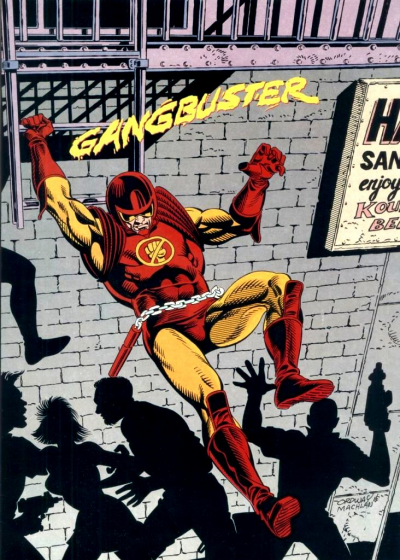
I look back on Death of Superman now as a well-constructed story of its type, and certainly the biggest ever attempted. It follows the well-worn model of “tear ’em down to build ’em back up again.” Here, they took that to its ultimate extreme by actually killing the protagonist and a rather, ah, important one at that. DC certainly but the full weight of their promotional efforts behind their convictions too. People deride DoS as a quick cash grab, but let’s not forget that all the Superman books were placed on hiatus for three months in its aftermath. Foregoing those dollars was a hefty opportunity cost at a time when publishing these books was like printing money. I admire that kind of commitment in service to the story. There are smaller, introspective stories in the same vein that struck a chord more intimately and are therefore held in higher esteem (for me, Daredevil’s “Born Again”). That’s to take nothing away from DoS. As a reader, I was certainly taken for a ride. I’m OK with that at the end of the day because I felt like its architects appreciated the craft of storytelling and had a deep respect for the characters they were entrusted to oversee as caretakers. DoS might have been a stunt, a gimmick designed to capitalize on the comics bubble, but it also stands as a worthy character study. These interpretations need not be mutually exclusive.
5. The story arc came under fire from critics at the time due to the creation of a new foe, Doomsday, which ultimately killed Superman. What are your thoughts on Doomsday and the way the actual death was handled? Should Kal-El have fallen to the hands of a more historic foe like Lex Luthor?
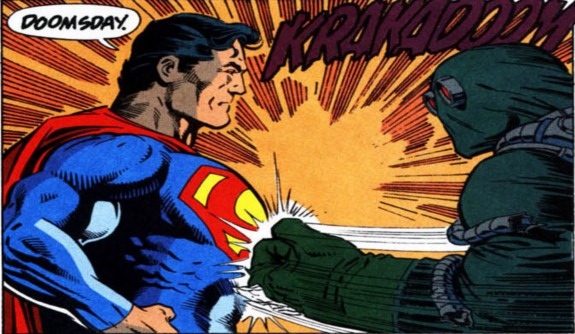
Greg: I love Doomsday. There, I said it. He is mindless rage incarnate, and that is every bit as legitimate as the all-brains-no-brawn villain. Superman needed a foe that could not only match him physically (after all, Mongul and Darkseid fit that bill) but represent his opposite. Where Clark Kent represented humanity and compassion, Doomsday represented pure animalism, violence and malevolence. I’ve always been intrigued by seeing how heroes respond to beings that can’t be reasoned with, reformed or even really stopped. Doomsday has been horrendously misused ever since then, but I will forever love his role in this story.
I’ve never bought the argument that Luthor should be the one to kill Superman. To me, that’s as wrong as the Joker being the one to finally kill Batman. The two characters are intertwined. Lex Luthor is who he is because of Superman, and Superman (at least partially) is who he is because of Luthor. Luthor “winning” somehow invalidates their ongoing chess match to me, because it is meant to go on forever. Also, there is more story to mine out of Luthor or the Joker dealing with both their nemesis being gone and their own failure to defeat him (see the excellent Batman: The Animated Series episode “The Man Who Killed Batman”). Doomsday was an opportunity to craft a new villain with a new, distinct characteristic – the one thing that actually beat Superman.
Nick: To borrow a wrestling analogy, having Darkseid or Lex Luthor be the villain to strike the death blow would have been giving a rub to a character that didn’t really need it. There are interesting places to take Luthor or Darkseid, but those characters are iconic already without the rub of killing Superman, It’s rare in comics to be able to create a new character with staying power, so anytime you can do that, it’s probably a good idea. So, having Doomsday set up as the new big bad was a good move in my mind, even if they’ve been unsure how to handle the character in the years since.
Todd: Doomsday is such a boring, one-note villain. I initially thought Doomsday’s look was pretty lame in his scrubs and goggles, but as the reveal occurred I thought he was kind of bad-ass. I guess I was especially annoyed that they he was a Kryptonian laboratory creation, and not ultimately a result of Luthor’s genius. My favorite Superman Story remains Alan Moore’s “Whatever Happened to the Man of Tomorrow”, and that story teams-up Superman’s established villains to take him down. I’d obviously have preferred that approach in “The Death of Superman”, but maybe without the satanic Mr. Mxyzptlk. That dude gave me the creeps.
Russell: Doomsday isn’t my favorite Superman villain, though I like the physical challenge he represents. I do sort of wish Lex Luthor’s involvement in Superman’s death had been different. Like maybe have him be responsible for the creation of Doomsday or at least responsible for finding him and unleashing him on the world. But I’m a bigger Brainiac fan than Luthor, so I think I would have preferred some combination of those three being responsible for Superman’s death. It would have carried even more weight, I think. And the way Doomsday has been handled since the Death and Return of Superman hasn’t been all that great. Especially in the story where they gave him consciousness and allowed him to feel “fear.”
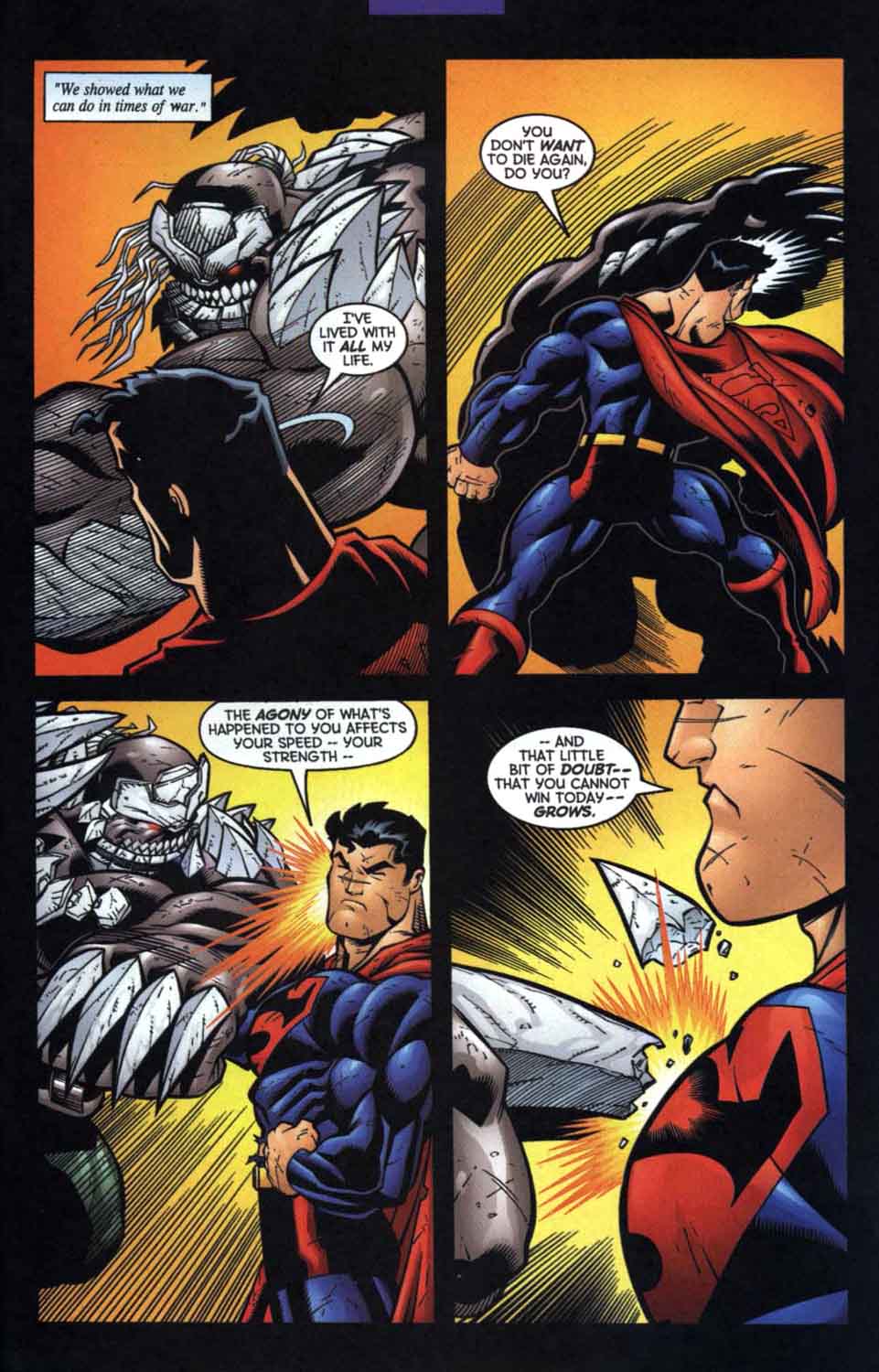
Tim: Minor quibbles over the method of execution aside, I had no problems buying into Doomsday as the killer. He was mighty fearsome and made a huge impact right out of the gate. His push was hotshotted, to be sure, but they still managed to put him over some enhancement talent in the form of the Jobber League on his way to the top.
Slightly strained analogies aside, I do wonder what would have been gained by having Superman go down to an established foe. Who would fit the bill? The (perceived) albatross of a shitty rogues gallery has long been a drag on this character. Brainiac? Do you really want to saddle him with that kind of baggage? And what does it say for his credibility when he effectively kills Superman in this story, but fails to get the job done *again* following his inevitable resurrection? Metallo, Parasite, or Bizarro? Kind of low-rent. Toyman? Mr. Mxyzptlk? Please. Really, if any pre-existing character were to get the nod, your options begin and end with Luthor. And he was occupied by some rather complicated developments of his own at the time. Doomsday was just a means to an end. It would’ve been a shame to derail Luthor’s carefully-orchestrated character arc for the sake of imbuing a Big Event with a false sense of… what? Tradition? It just would’ve been an out of nowhere twist. Keep Luthor on the sidelines and let his story play out as intended.
DC could not tailor a story of this magnitude to the sensibilities of a rather narrow hardcore comics audience. (Not as narrow as it is today, but a few hundred thousand regular readers still pales in comparison to the millions that would be glued to the page for this.) As such, the Death of Superman needed to be as simple and accessible as possible. My understanding is that Dan Jurgens had also been itching to introduce a new villain who would be the physical threat to match Luthor’s intellectual prowess. This character would put Superman through the meat grinder like no one else before. I can see why it made sense to combine the two basic objectives of, “Let’s beat the crap out him!” and “Let’s kill him!” when a crowded publishing schedule somewhat limits your window. Say. I wonder if Superman holds a massive grudge against the professional wrestling industry, post-resurrection.
6. One of the lynchpins of both “The Death of Superman” and its immediate follow-up (part of the same story) “Funeral for a Friend” was the relationship between Clark and the Kents, still very much alive at the time. Do you feel Superman’s story is strengthened (as John Byrne believes) or weakened (as Mark Waid believes) by the Kents being alive rather than dying when Clark is young?
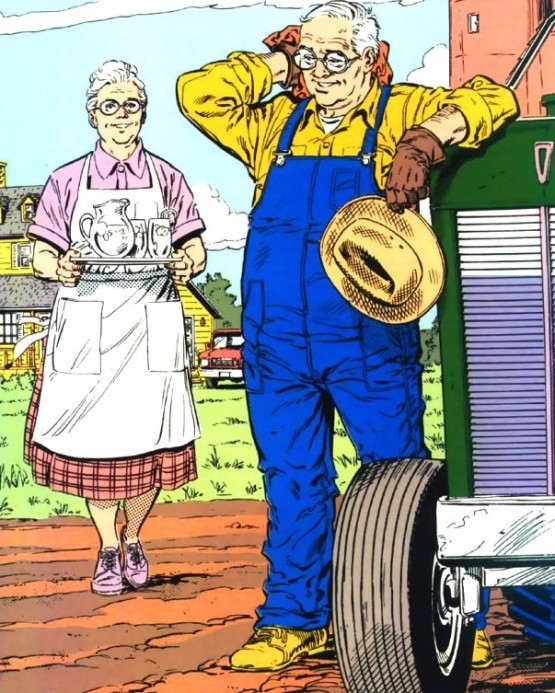
Greg: I’m with Byrne on this one. First off, the Kents are simply great characters. They are the best parents in all of comics. In fact, they’re unique in that they’re two of the only good parents in comics, as they are largely responsible for Clark being the man that he is. In addition to making Clark stand out from Batman, Spider-Man and all the other kids with parent issues of various sorts, the Kents make Superman more human than Kryptonian, and that’s always been the most interesting version of the character to me. One of the most heart-wrenching panels I’ve ever read in a comic was Jonathan and Martha Kent being forced to watch their son’s funeral on television, unable to even attend.
Not only do they provide their own interesting angles in the story of Superman, but they give Clark someone to lean on. Batman has Alfred, Spider-Man has Aunt May and (later) Mary Jane, but Clark really has nobody that he can really level with, outside the Kents and Lois. I found Superman a much more interesting character back in the early ‘90s, and the Kents were a large reason why. The double-orphan element not only adds an unneeded extra level of angst, but it somewhat weakens the (already dubious, in my eyes) role of Jor-El and Lara in the narrative.
Nick: To me, Superman comes from a brighter, more optimistic place than some of his other Justice League counterparts, most notably Batman. To that end, I think having the Kents still alive helps to further distinguish him from other tragedy-driven characters. Plus, it gives him a deeper connection to humanity, which is the entire point of the character — his need to feel like one of us.
Todd: I am an absolute mark for the Richard Donner/Christopher Reeve Superman films (Superman and Superman II). With the exception of the whole turning back time by reversing the Earth’s rotation (who the hell thought that up?) those films highlight MY Superman. Clark grows up and takes responsibility when Pa Kent dies, and it’s key to his mythos. I love how both the Smallville TV show and the new “Man of Steel” film explored the Clark/Jonathan relationship further, and showed how Pa Kent’s life and death motivated Clark to fight for truth, justice, and the American way. As much as it would pain my teenage self to hear myself saying this, John Byrne’s wrong on this one.
Russell: Personally, I like when the Kents are alive in the story rather than dead. Both have merits, but the Kents being there for Clark when he needs advice has been one of those story tropes I feel allows him to be truly separate from Batman or even Wonder Woman. Batman has Alfred and Wonder Woman has Hippolyta and some of her other Amazon sisters, but the Kents were those classic mom and dad figures it was easy for me to relate to growing up. That’s something that always helped keep Superman grounded, in my opinion. While he got in touch with his alien side later in life, it was always good to have that reminder of his actual upbringing around to keep him focused on the bigger picture. But I do think that the Kents should pass away at some point in his story, just not from the beginning of his time as Superman. Geoff Johns gave Jonathan Kent a very emotional death in his Action Comics run with Gary Frank. It stands as one of my all-time favorite Superman stories.
Tim: I’ve reached the point where I can appreciate the arguments both for and against. John Byrne’s post-Crisis Man of Steel is “my” Superman. “My” Superman has living parents, thankyouverymuch. Nevertheless, there is something to be said for making the character an orphan twice over, cutting him loose in the world without the guiding hand of Ma and Pa. Do their values transcend their own time on Earth, not to mention Clark’s Kryptonian heritage? There’s a nature vs. nurture element here worth exploring. (I don’t quite see the point in keeping one alive and not the other, though.)
That said, the Kents are just nice characters in their own right. They are used to great effect as supporting characters in the Triangle Numbering era, and give the death some pathos it otherwise would have lacked. Whilst digging a ceremonial grave for their son, Jonathan has this line like, “It just feels so goddamned empty!” and it kills me, every time. I know this isn’t part of the specific issues in question, but their general helplessness and isolation over the course of the story is so gut-wrenching and cruel. Just goes to show that these characters have value in the hands of creators who know how best to exploit it.
More on Page 3